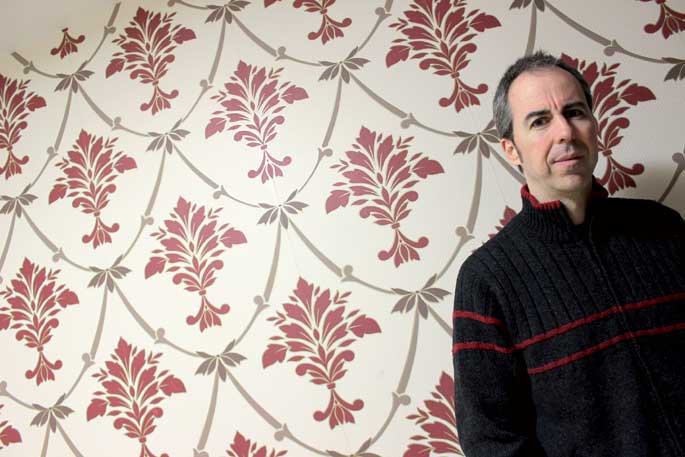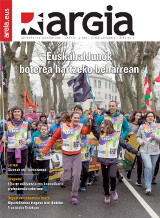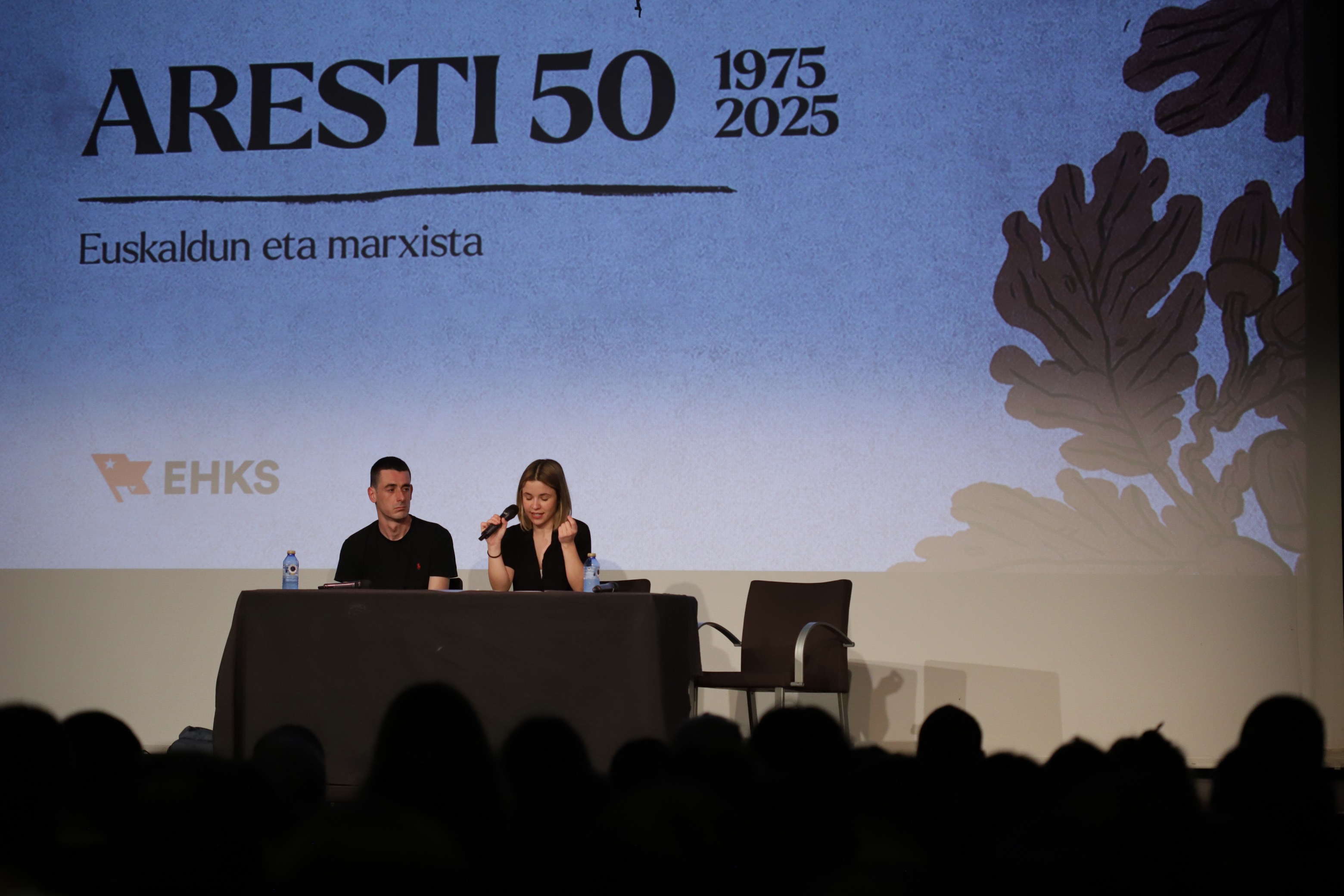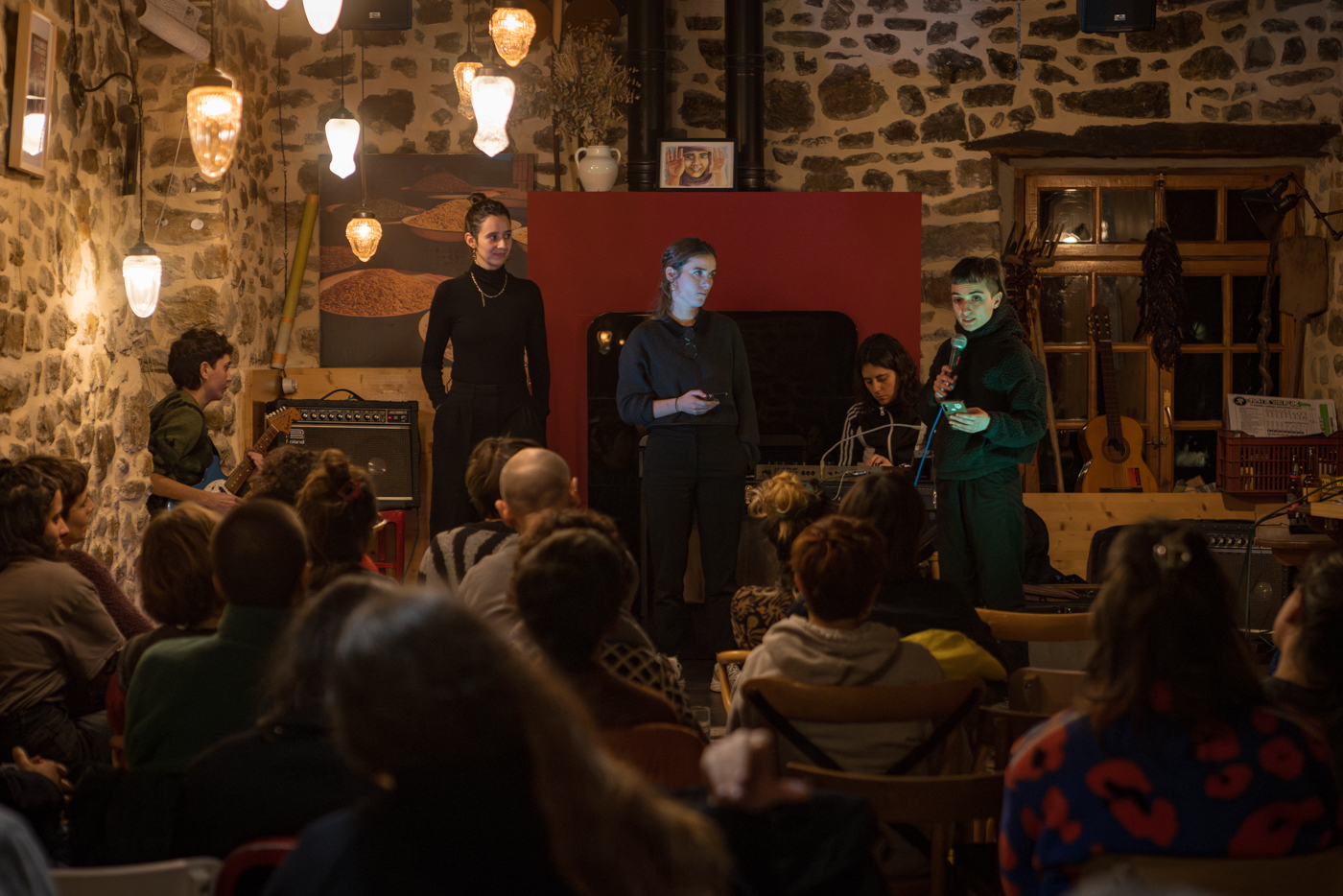"We're all in that wheel of violence."
- The dictionary says that the word “violence” comes from that Latin “violentia”, which has as adjective “violentus”, that is, “which uses force without rest”. “Vis” appears in its origin, that is, “force”. In Euskera we have violence, violence, violence, violence and others. Last year the bones of Unai Elorriaga (Susa, 2014) are narratives, novels, essays, reflections, chronicles...

Violence, violence, violence… We arrived at Algorta, we entered the village, we followed the road and there we met the great Spanish flag: Civil Guard headquarters, not small, in the courtyard of the neighborhoods. Its armed presence also has it from violence.
For us, yes. I walk around every day, taking my daughter to the ikastola. And when I'm young, every day I walk around, especially around the ikastola. And I never got used to, and I'm not going to get used to, seeing that huge little banderin and those guys with a shrapnel in my hand. This presence violates you in part. The passage through there is not convenient for us, and I think it is not convenient for them either, the individual civil guards. Violence is a state of affairs that someone or whoever sends out, and local actors, on the contrary, are very uncomfortable.
To what extent does the beginning of a book matter?
I usually write in a linear way, from and to the end, although I have a structure in my head, and depending on that structure I confuse the written. Once I have finished, I rewrite the initial paragraphs. Always. I think it is very important to give tone to the book. Initiation. In the four previous books, I've always finished writing and I've come back to the beginning, trying to recompose the tone. On this occasion I did not have to do anything like the bone of last year, because I made three attempts ahead and in the third I took the tone as I wanted.
I will change the first paragraph: “Irene Arrieta made a tear of almost a centimeter and a half when he was born in Algorta on 25 January 1971. A lot of blood was mixed in the mother's thighs, perhaps some thick fluids. (…) All this in the center of Algorta, very close to the railroad, on Avenida del Militar Street, as they said to the Civil Hospital of the Generalsimo of Basurto in Bilbao, when two years later they led the Little Eustachian Mendizabal to die, with a hole in the back and another in the head, which entered the front and was expelled in the occipital.
Here's a summary of the book, a synthesis. Blood is on the front line, even if it is another form of blood, of birth… I have tried to reflect on violence. To reflect, we sometimes limit ourselves. Or, on the contrary, very far away. The book is written in a compact style, and in four hundred pages you can tell a lot of things. My effort has been to look at violence from all sides. Or for the parts that I can perceive, there will be others. To this end, I have addressed what we have seen and the farthest: Algorta, one; Rwanda, the other. Also those in the middle… The one in South America is not so far away, it is known, we have read it. The European is not so far away either. The Asian is terrible... Anyway, one day, while I was writing, I felt that something escaped me, that what I wanted to tell could not be counted as an attempt, and that is why I interspersed stories between the sections. There are things to be told from the most fictional fiction, and in my opinion, the story is the most fictional fiction. What has happened in Mauthausen can tell in the first person what he has lived, while I, as I have not lived, have to tell from fiction, and that is why I have used stories.
You've come out of Algorta on the road to violence, to tell us about the outdoor violence in the world.
I have taken into account that we have thought a great deal about violence, because we have had it by our side, because we have been touched by friends, acquaintances, relatives. We've reflected on our violence, but to better understand it, I realized that the best thing would be to analyze other violence, if different, how what happened to us was terribly different elsewhere. You examine it, and you realize that ours is nothing but a grain. How can we reconcile ours with others? That was my job, but not to come to a conclusion, but to put the situations side by side and to put into evidence what you see.
Can a conclusion be reached?
I think not, but that is the trend, to draw conclusions. Even more so in this light society, which wants nothing but synthesis. Literature, on the other hand, seems to me a place of reflection, that moves something inside your head and opens you up. He has still learned now that Oliver Sacks has contracted an incurable illness and is going to die soon. Sacks himself has made several considerations about death and yet I am sure that at the time of death he will also make some thoughts that he has not done so far. There are no pulls, we do not know where we are, who we are... even if we reflect, we have to be clear that we are not going anywhere.
The book consists of four sections. The first three are in one way; in them we will meet Irene, we will renew foreign violence, you will join Basque raffles in the thread of the narrative, your readings will also appear…
I've written this book as if I didn't write it until later. In previous books, I counted a lot of things, but I always left some sections to write in the future. But this time I haven't, I've flushed everything I have in my bowels. Because you never know when the last one will come!
The first three paragraphs are in one way, while the fourth is totally different, like killing the work.
I always say: when I put the first word, I know what the last word in the book will be. Of course, there will always be some small change, structural modifications here and there, but I have already made the main skeleton from the very beginning. It was the fourth section I wanted to finish the book with. I descended to a certain and concrete scenario of violence: I wanted to show that nobody is free, that we are all in that circle of violence and that at any time it can happen that violence hits us anywhere, that is, that violence that seems distant to us can touch us at any time. And if it's not us, one from Switzerland, for example. In 1921 the Jews lived very rich in Germany and Europe. You wouldn't think about what was going to come to you. The same applies to tutsis and so on.
In Izareta only the story would deserve the book. The discomfort that this story produces!
That's what the woman said to me. He first read the book and told me that story had made him a bad pass. The story tells the fear that I have always had – especially since my daughter was born – and I have also cast it out. I was very happy when I wrote the story.
We always talk about education, but in your book, Rwanda's Tutsis says that education doesn't improve the person, it makes it more effective.
There's a cartoon there, dictators are simple, ignorant people -- but there are people who have studied biographies and found that they're cultured people, educated people. A Romanian professor says that his genocide was prepared at the university: several professors developed a strategy to start spreading fragments of propaganda, phrases, on the radio. The objective of this strategy was to gradually raise awareness of the Hutus, to warn them, to kill others. The strategy was invented at ButaR University.
So is there no hope? Do we have to learn to live with violence?
As for education, it seems that the person is educated to be more productive in college, to earn more and more money in companies, to expand around the world. So we would need another education. I think it also learns not to be violent. However, if our work is focused on competitiveness, “I above, you below,” it will not come well. And the biggest universities are in it.
You said in the presentation – if you want, half-word – if you are not going to write more. Or it's published. That has partly shaken.
I understand the literature in my own way: it is not a chair, once there, a chair, a chair, a chair in which we are sweet… you don’t necessarily have to publish something every year. For me, it's been a very special thing from a young age. I'm not willing to publish a book every year and talk about anything. I want to write slowly, and when I have something to offer, give it to me. To do so, you cannot be a professional as I have been so far. This creates a Kafkaesque situation, something very important to you, which is your profession and your profession, is hung with fine yarns. “What do I do here wasting my time? I prefer to do another job and write it, as something important to my existence, but without doing my profession.” That's what I thought, and that's what I'm moving on, going through other paths. In the meantime I will keep writing and, when I have something important to give, I will publish it, whether every five, seven, ten or twelve years.
Astelehen honetan hasita, astebetez, Jon Miranderen obra izango dute aztergai: besteren artean, Mirande nor zen argitzeaz eta errepasatzeaz gain, bere figurarekin zer egin hausnartuko dute, polemikoak baitira bere hainbat adierazpen eta testu.
Martxoaren 17an hasi eta hila bukatu bitartean, Literatura Plazara jaialdia egingo da Oiartzunen. Hirugarren urtez antolatu du egitasmoa 1545 argitaletxeak, bigarrenez bi asteko formatuan. "Literaturak plaza hartzea nahi dugu, partekatzen dugun zaletasuna ageri-agerian... [+]
1984an ‘Bizitza Nola Badoan’ lehen poema liburua (Maiatz) argitaratu zuenetik hainbat poema-liburu, narrazio eta eleberri argitaratu ditu Itxaro Borda idazleak. 2024an argitaratu zuen azken lana, ‘Itzalen tektonika’ (SUSA), eta egunero zutabea idazten du... [+]






















